Charles E W Bean, Diaries, AWM38 3DRL 606/58/1 - September 1916 - Part 5
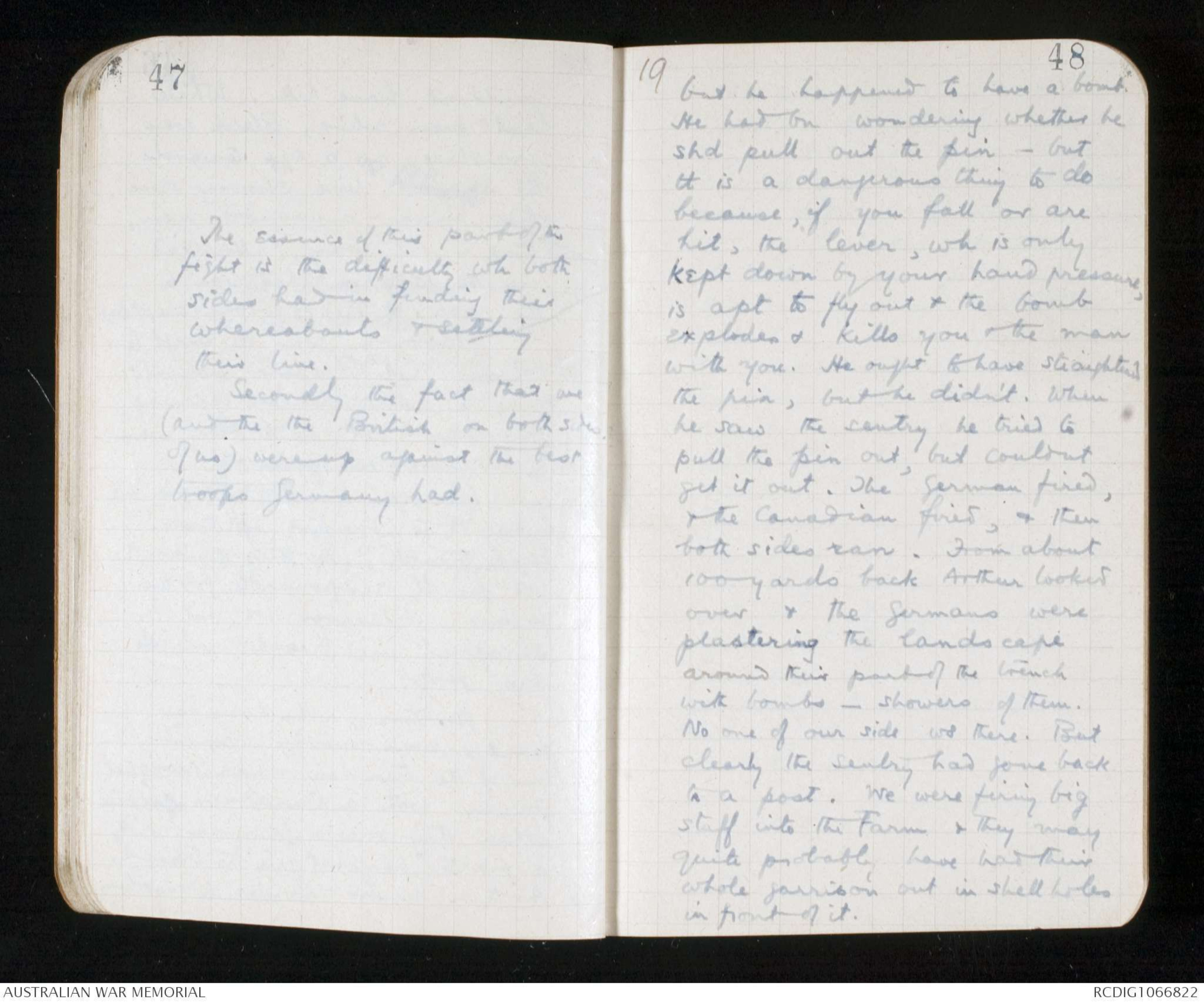
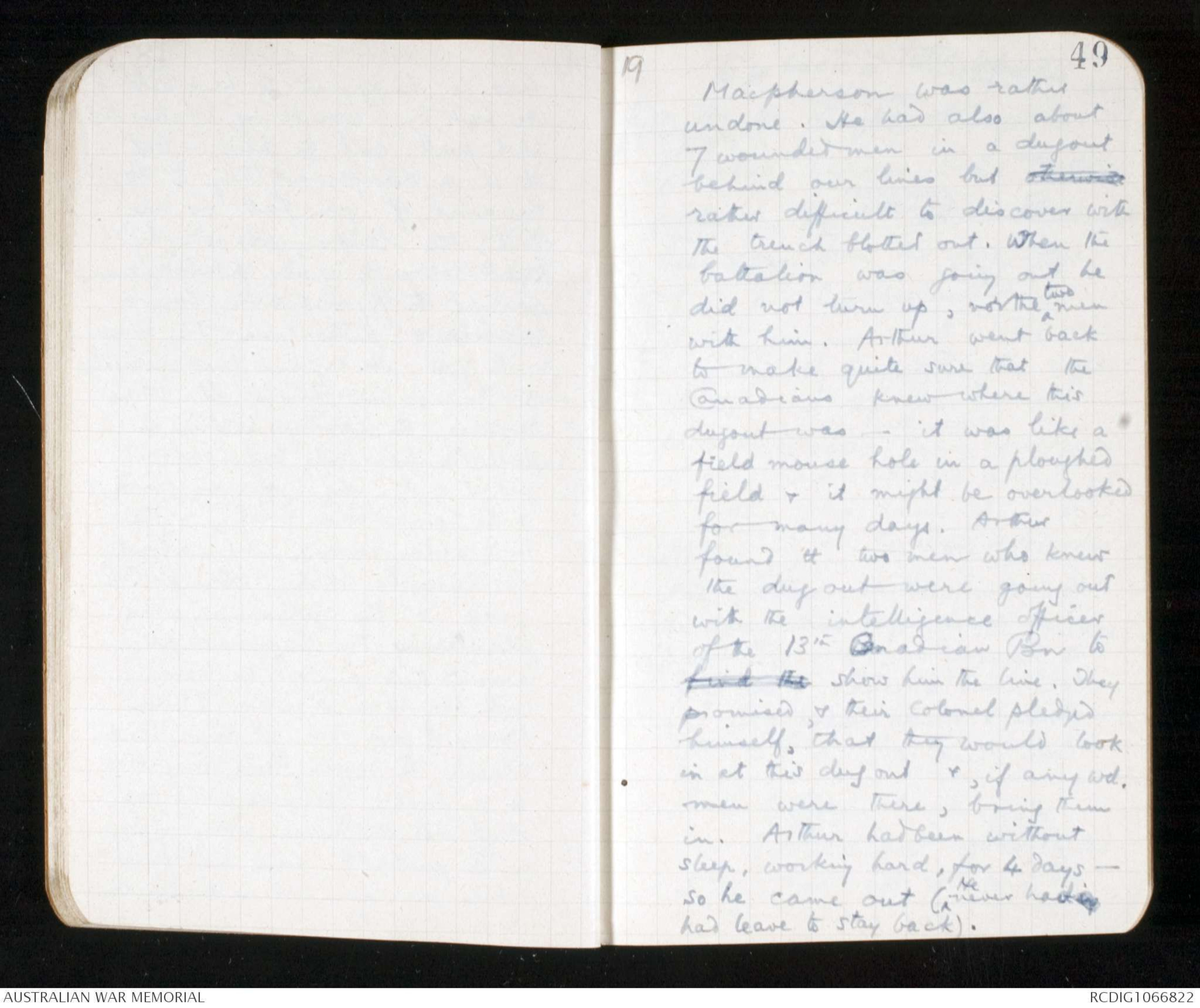
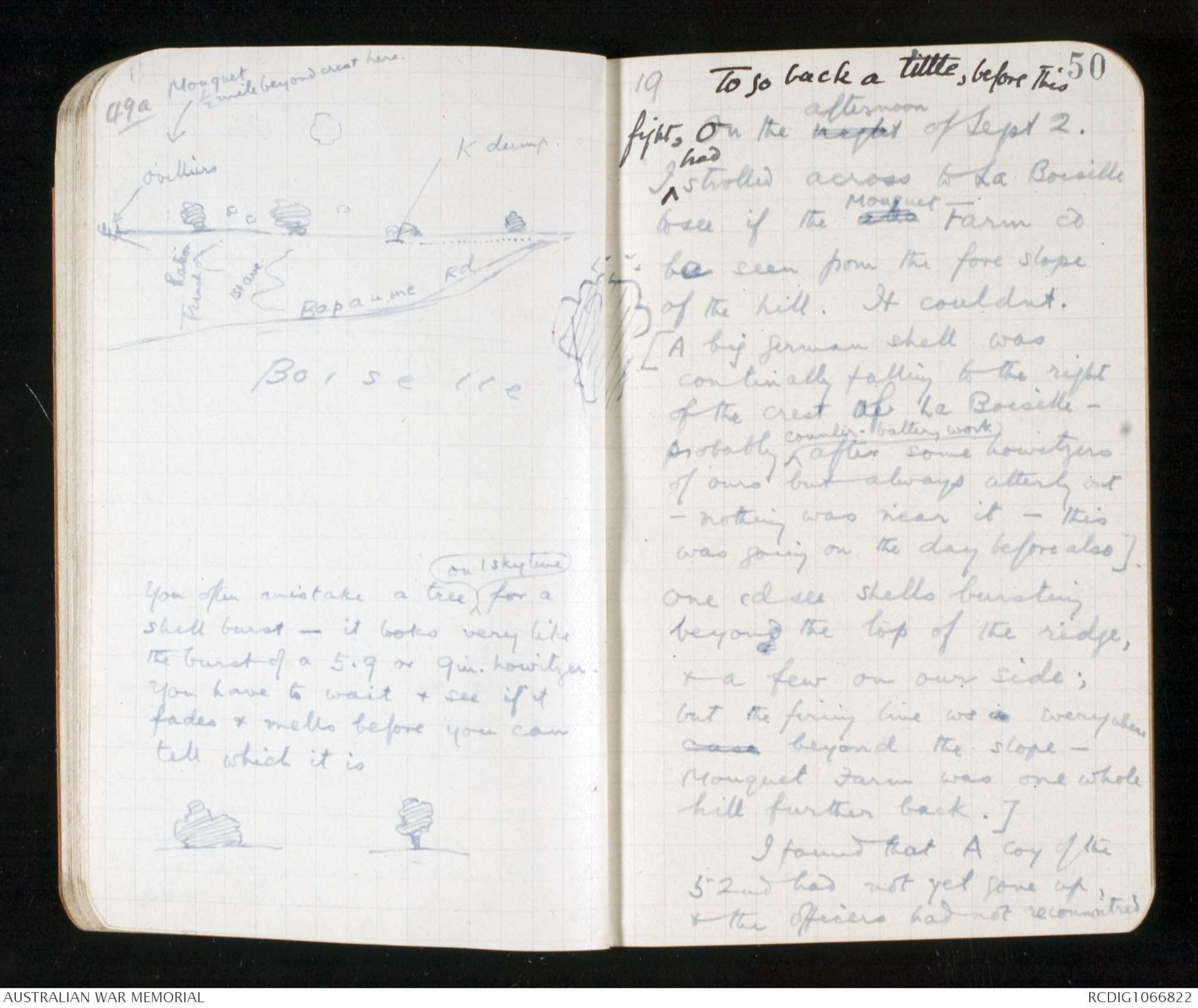
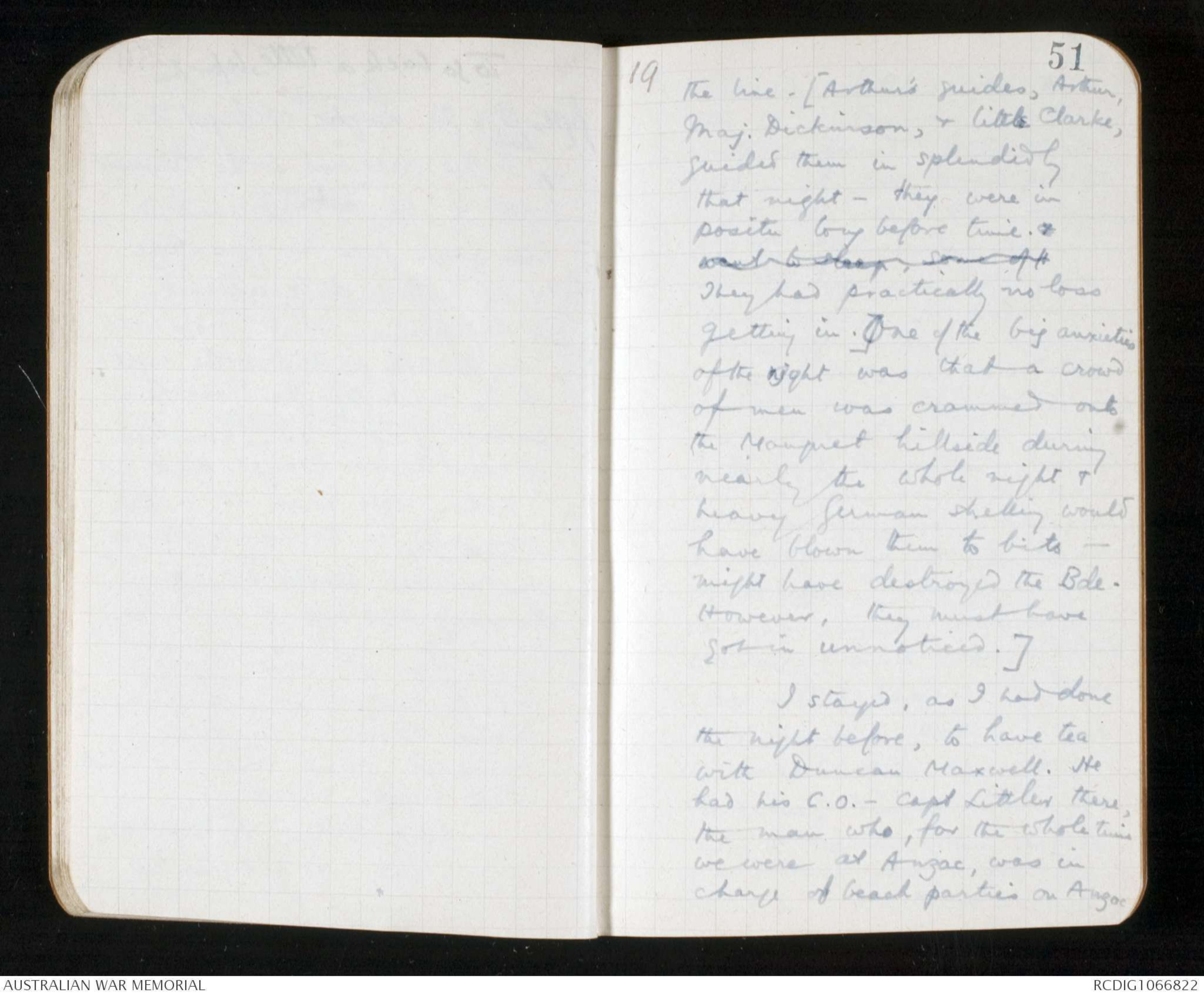
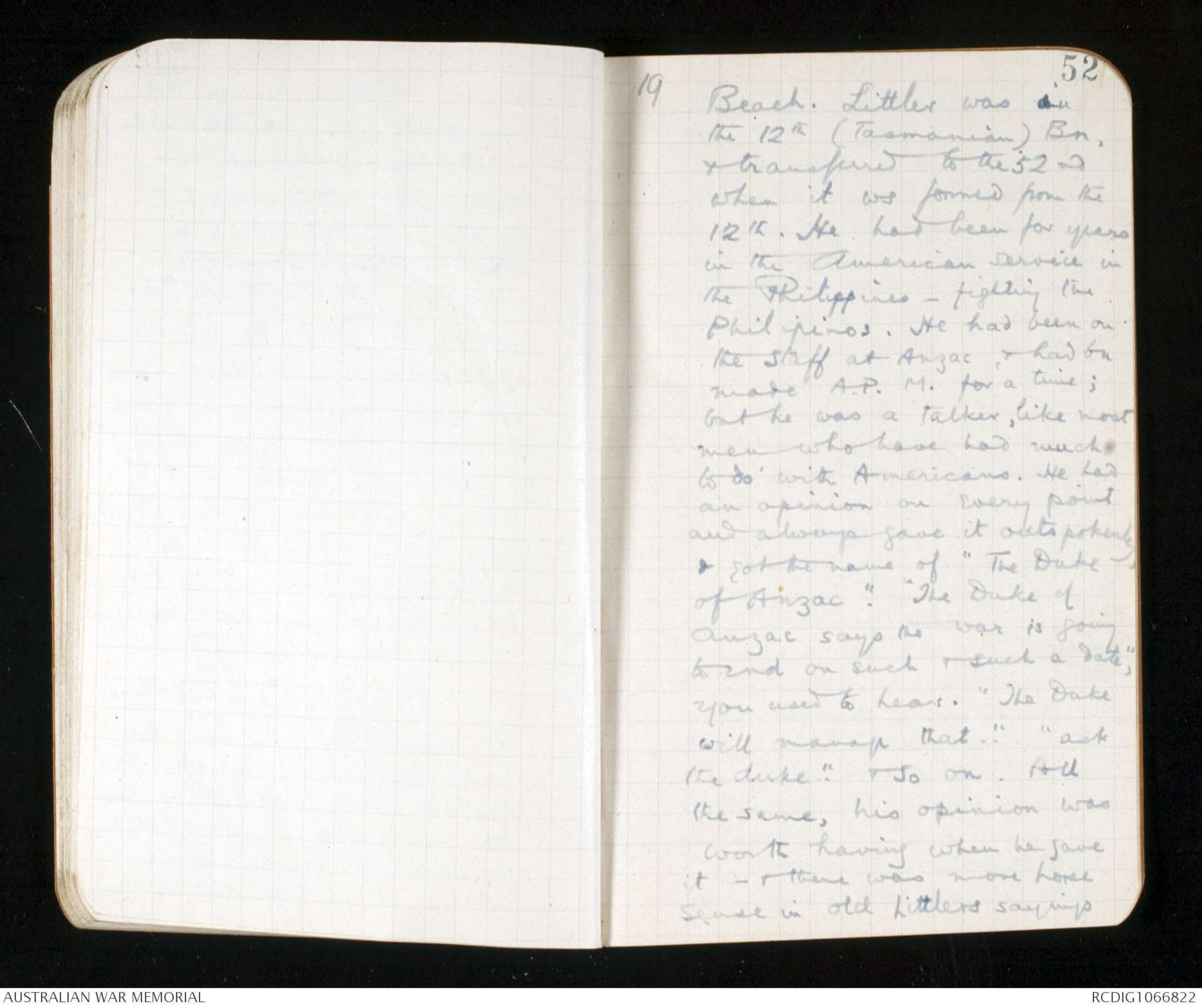
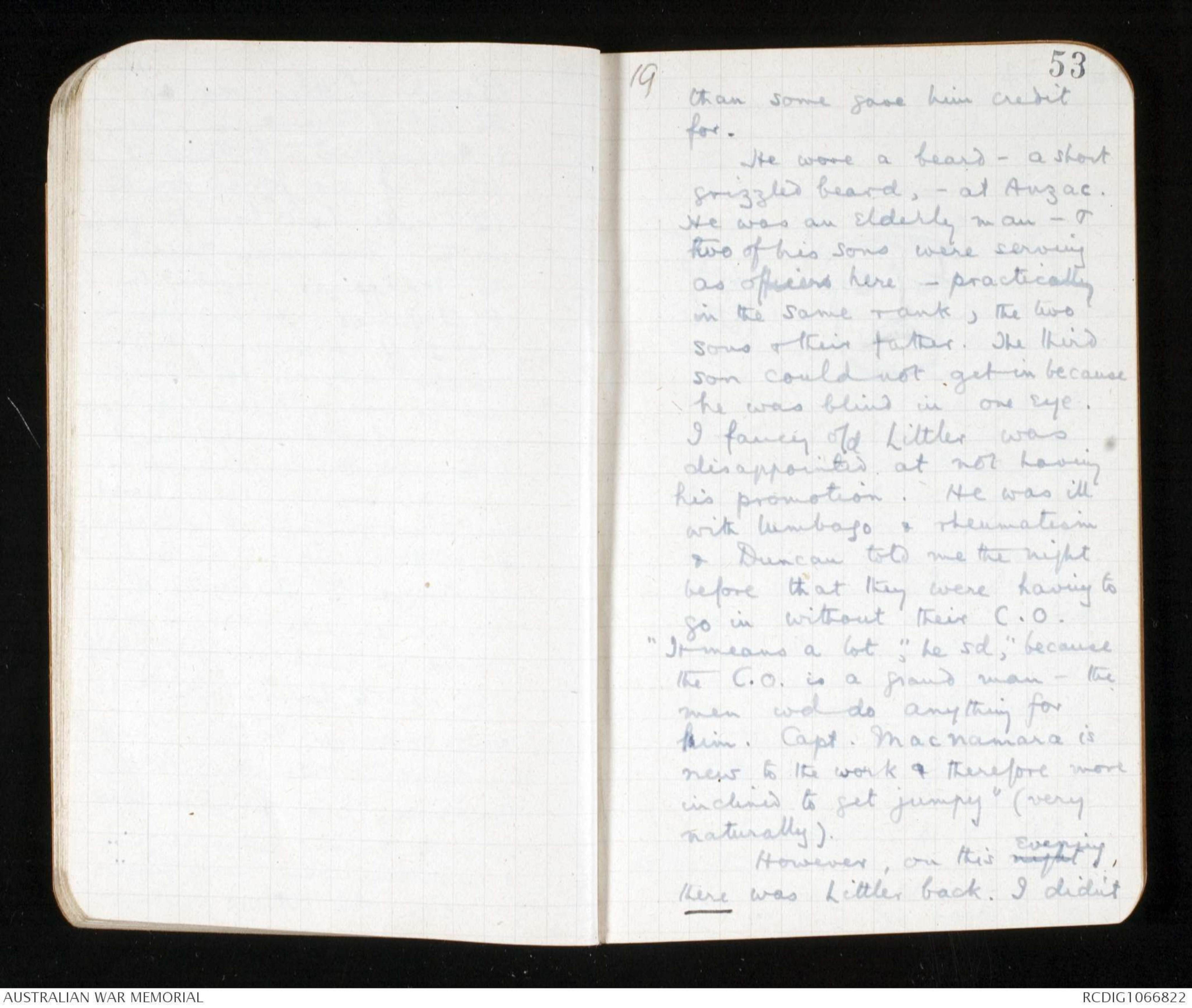
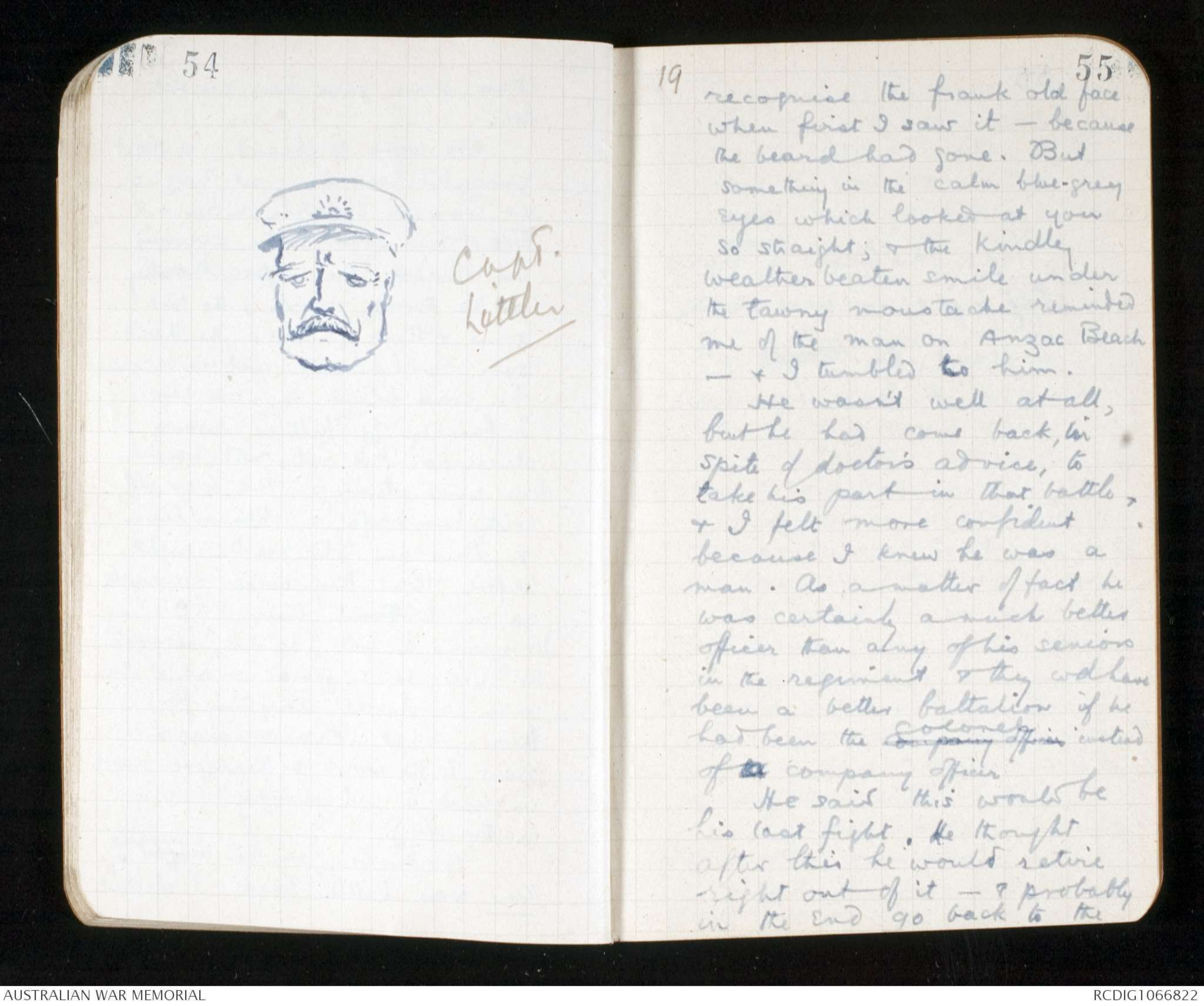
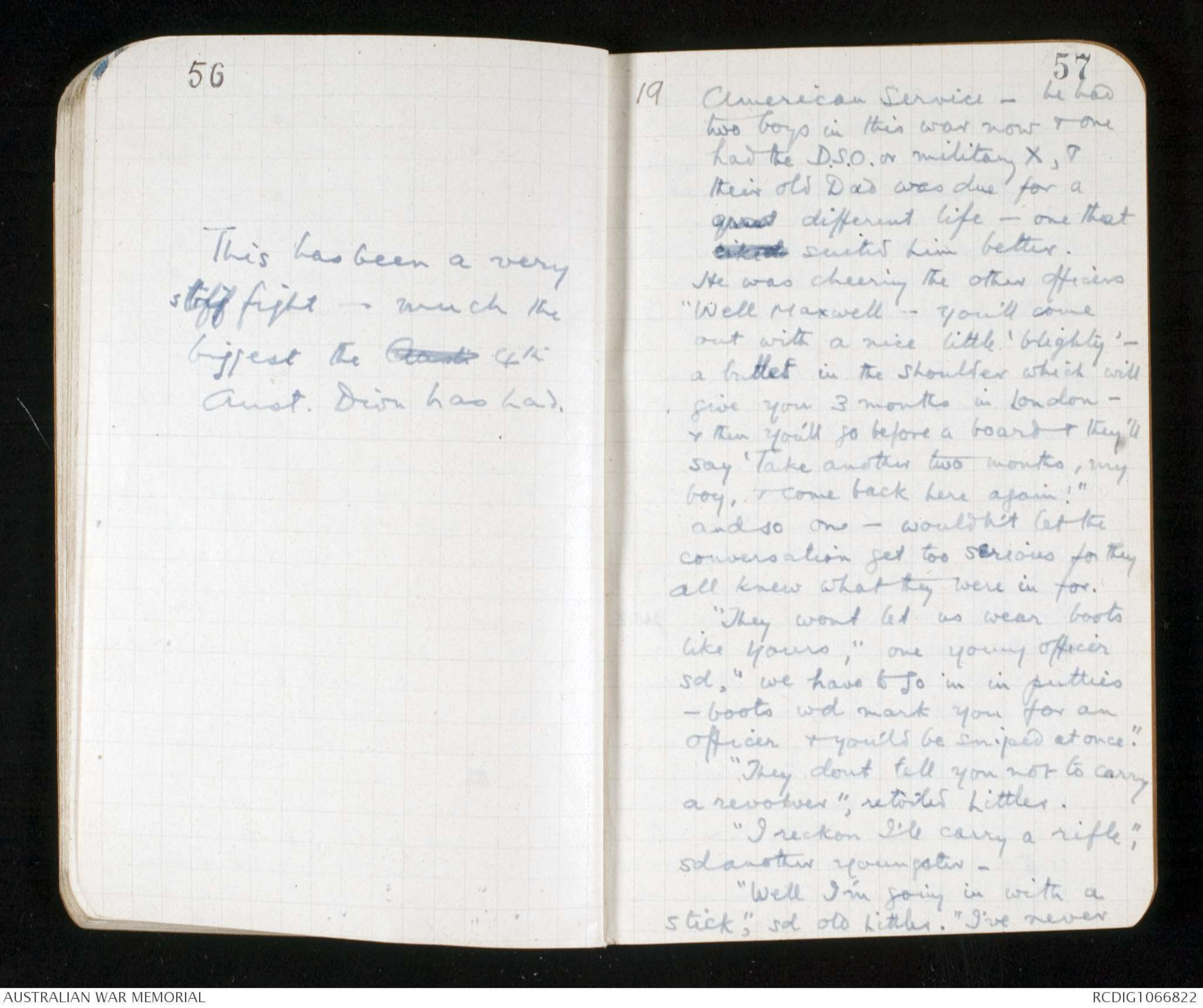
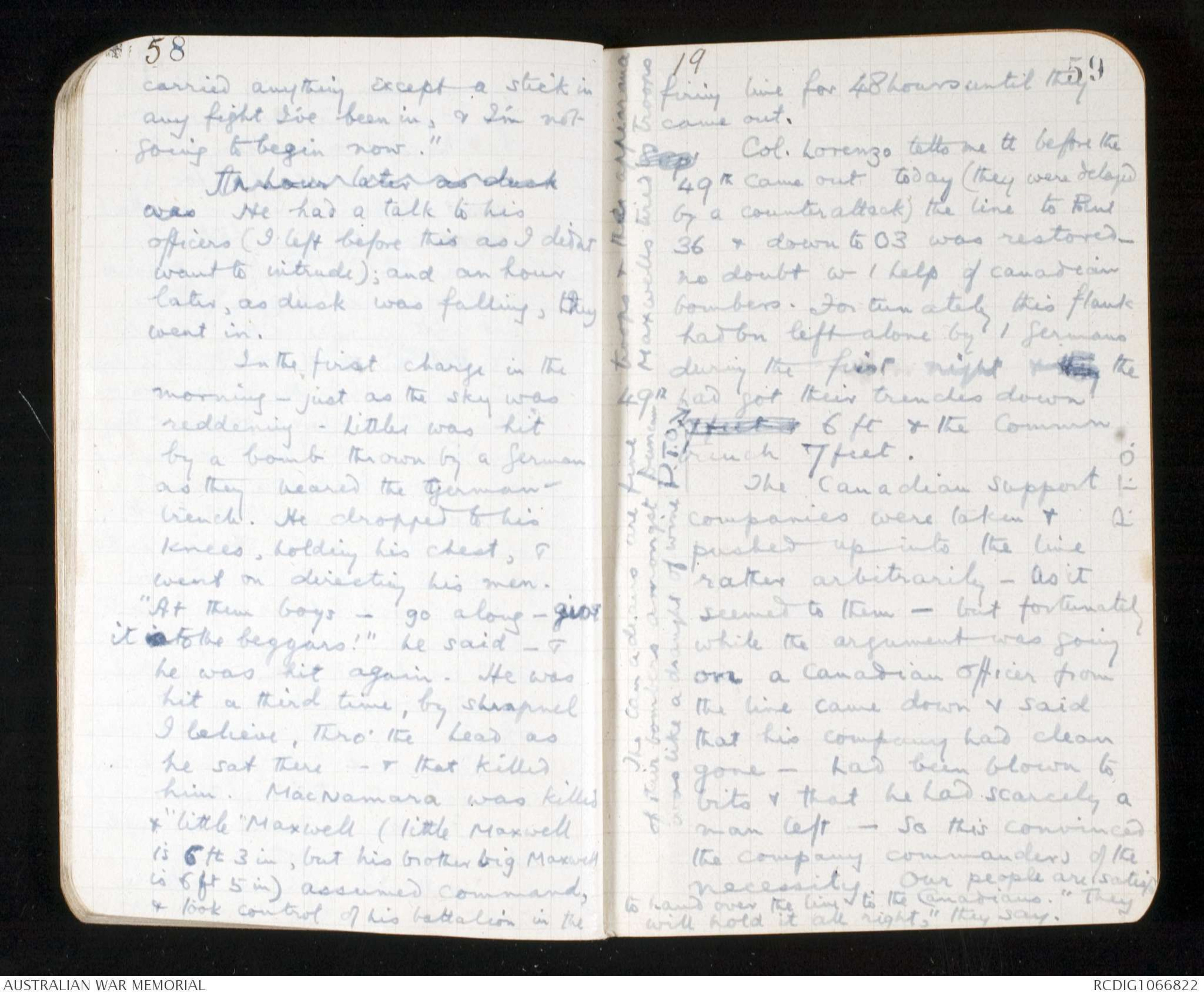
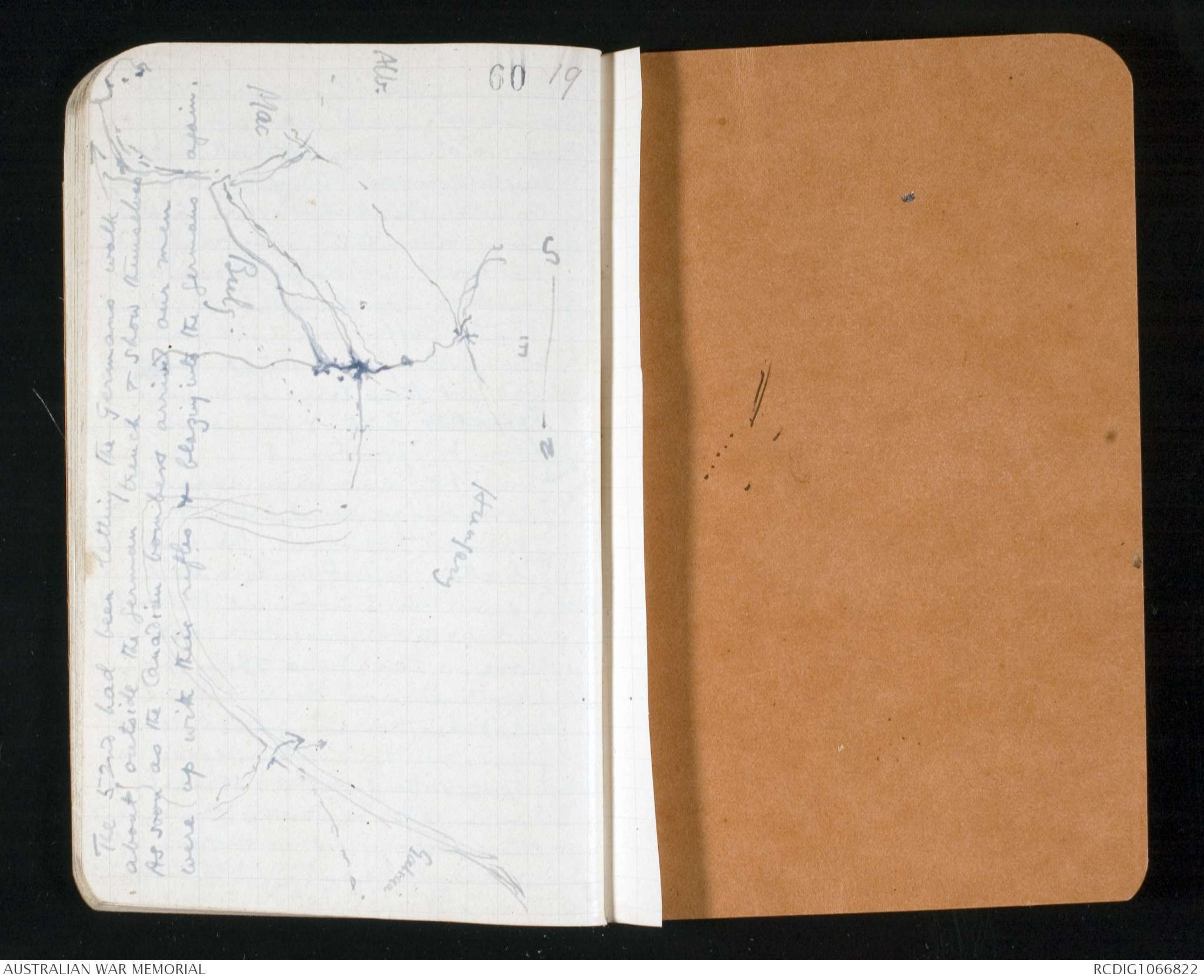
47
The essence of this part of the
fight is the difficulty wh both
sides had in finding their
whereabouts & settling
their line.
Secondly the fact that we
(and the British on both sides
of us) were up against the best
troops Germany had.
19 48
but he happened to have a bomb.
He had bn wondering whether he
shd pull out the pin - but
tt is a dangerous thing to do
because, if you fall or are
hit, the lever, wh is only
kept down by your hand pressure,
is apt to fly out & the bomb
explodes & kills you & the man
with you. He ought to have straightened
the pin, but he didn't. When
he saw the sentry he tried to
pull the pin out, but couldn't
get it out. The German fired,
& the Canadian fired, & then
both sides ran. From about
100 yards back Arthur looked
over & the Germans were
plastering the landscape
around their part of the trench
with bombs - showers of them.
No one of our side ws there. But
clearly the sentry had gone back
to a post. We were firing big
stuff into the Farm & they may
quite probably have had their
whole garrison out in shell holes
in front of it.
19 49
Macpherson was rather
undone. He had also about
7 wounded men in a dugout
behind our lines but otherwise
rather difficult to discover with
the trench blotted out. When the
battalion was going out he
did not turn up, nor the ^two men
with him. Arthur went back
to make quite sure that the
Canadians knew where this
dugout was - it was like a
field mouse hole in a ploughed
field & it might be overlooked
for many days. Arthur
found tt two men who knew
the dugout were going out
with the intelligence officer
of the 13th Canadian Bn to
find the show him the line. They
promised, & their colonel pledged
himself, that they would look
in at this dugout &, if any wd.
men were there, bring them
in. Arthur had been without
sleep, working hard, for 4 days -
so he came out (He never hading
had leave to stay back.)
49a
Diagram - see original
Boiselle
You often mistake a tree ^on / skyline for a
shell burst - it looks very like
the burst of a 5.9 or 9 in. howitzer.
You have to wait & see if it
fades & melts before you can
tell which it is.
Diagram - see original document
19 50
To go back a little, before this
fight, on the night afternoon of Sept 2.
I ^had strolled across to La Borsille
to see if the abo Mouquet Farm cd
be seen from the fore slope
of the hill. It couldn't.
[A big German shell was
continually falling to the right
of the crest of La Borsille -
probably ^counter-battery work after some howitzers
of ours but always alterly out
- nothing was near it - this
was going on the day before also].
One cd see shells bursting
beyond the top of the ridge,
& a few on our side;
but the firing line ws in everywhere
case beyond the slope -
Mouquet Farm was one whole
hill further back.]
I found that A Coy of the
52nd had not yet gone up,
& the officers had not reconnoitred
19 51
the line. [Arthur's guides, Arthur,
Maj. Dickinson, & little Clarke,
guided them in splendidly
that night - they were in
positn long before time. &
went to sleep, some of th
They had practically no loss
getting in.] One of the big anxieties
of the night was that a crowd
of men was crammed onto
the Mouquet hillside during
nearly the whole night &
heavy German shelling would
have blown them to bits -
might have destroyed the Bde.
However, they must have
got in unnoticed.]
I stayed, as I had done
the night before, to have tea
with Duncan Maxwell. He
had his C.O. - Capt Littler there,
the man who, for the whole time
we were at Anzac, was in
charge of beach parties on Anzac
19 52
Beach. Littler was in
the 12th (Tasmanian) Bn,
& transferred to the 52nd
when it ws formed from the
12th. He had been for years
in the American service in
the Philippines - fighting the
Philipinos. He had been on
the staff at Anzac, & had bn
made A.P.M. for a time;
but he was a talker, like most
men who have had much
to do with Americans. He had
an opinion on every point
and always gave it outspokenly
& got the name of "The Duke
of Anzac". "The Duke of
Anzac says the war is going
to end on such & such a date,"
you used to hear. "The Duke
will manage that." "Ask
the duke". & so on. All
the same, his opinion was
worth having when he gave
it - & there was more horse
sense in old Littlers sayings
19 53
than some gave him credit
for.
He wore a beard - a short
grizzled beard, - at Anzac.
He was an elderly man - &
two of his sons were serving
as officers here - practically
in the same rank, the two
sons & their father. The third
son could not get in because
he was blind in one eye.
I fancy old Littler was
disappointed at not having
his promotion. He was ill
with lumbago & rheumatism
& Duncan told me the night
before that they were having to
go in without their C.O.
"It means a lot", he sd, "because
the C.O. is a grand man - the
men wd do anything for
him. Capt. Macnamara is
new to the work & therefore more
inclined to get jumpy" (very
naturally).
However, on this night evening,
there was Littler back. I didn't
54
Diagram - see original document
19 55
recognise the frank old face
when first I saw it - because
the beard had gone. But
something in the calm blue-grey
eyes which looked at you
so straight; & the kindly
weather beaten smile under
the tawny moustache reminded
me of the man on Anzac Beach
- & I tumbled to him.
He wasn't well at all,
but he had come back, in
spite of doctor's advice, to
take his part in that battle,
& I felt more confident
because I knew he was a
man. As a matter of fact he
was certainly a much better
officer than any of his seniors
in the regiment & they wd have
been a better battalion if he
had been the Company officer Colonel instead
of a company officer.
He said this would be
his last fight. He thought
after this he would retire
right out of it - & probably
in the end go back to the
56
This has been a very
stiff fight - much the
biggest the Austr 4th
Aust. Divn has had.
19 57
American Service - he had
two boys in this war now & one
had the D.S.O. or military X, &
their old Dad was due for a
quiet different life - one that
liked suited him better.
He was cheering the other officers
"Well Maxwell - you'll come
out with a nice little 'blightly' -
a bullet in the shoulder which will
give you 3 months in London -
& then you'll go before a board & they'll
say 'Take another two months, my
boy, & come back here again!"
and so on - wouldn't let the
conversation get too serious for they
all knew what they were in for.
"They wont let us wear boots
like yours," one young officer
sd, "we have to go in in putties
- boots wd mark you for an
officer & you'll be sniped at once."
"They dont tell you not to carry
a revolver", retorted Littler.
"I reckon I'll carry a rifle,"
sd another youngster -
"Well I'm going in with a
stick," sd old Littler. "I've never
58
carried anything except a stick in
any fight I've been in, & I'm not
going to begin now."
An hour later as dusk
was He had a talk to his
officers (I left before this as I didn't
want to intrude); and an hour
later, as dusk was falling, they
went in.
In the first charge in the
morning - just as the sky was
reddening - Littler was hit
by a bomb thrown by a German
as they neared the German
trench. He dropped to his
knees, holding his chest, &
went on directing his men.
"At them boys - go along - give
it xx to the beggars!" he said - &
he was hit again. He was
hit a third time, by shrapnel
I believe, thro' the head as
he sat there - & that killed
him. Macnamara was killed
& "little" Maxwell (little Maxwell
is 6ft 3in, but his brother big Maxwell
is 6ft 5in) assumed command,
& took control of his battalion in the
19 59
firing line for 48 hours until they
came out.
Sept Col. Lorenzo tells me tt before the
49th came out today (they were delayed
by a counterattack) the line to Point
36 & down to O3 was restored -
no doubt w t help of Canadian
bombers. Fortunately this flank
had bn left alone by / Germans
during the first night & they the
49th had got their trenches down
7 feet & 6 ft & the Commn
trench 7 feet.
The Canadian support
companies were taken &
pushed up into the line
rather arbitrarily - as it
seemed to them - but fortunately
while the argument was going
on a Canadian officer from
the line came down & said
that his company had clean
gone - had been blown to
bits & that he had scarcely a
man left - so this convinced
the company commanders of the
necessity. Our people are satisfied
to hand over the line to the Canadians. "They
will hold it all right," they say.
[* The Canadians are fine troops & the appearance
of their bombers amongst Duncan Maxwells tired troops
was like a draught of wine P.T.O*]
[*P.T.O.*]
60 19
The 52nd had been letting the Germans walk
about outside the German trench & show themselves
As soon as the Canadian bombers arrived our men
were up with their rifles & blazing into the Germans again.
Diagram - see original document
 Deb Parkinson
Deb ParkinsonThis transcription item is now locked to you for editing. To release the lock either Save your changes or Cancel.
This lock will be automatically released after 60 minutes of inactivity.